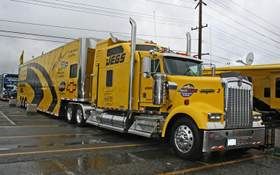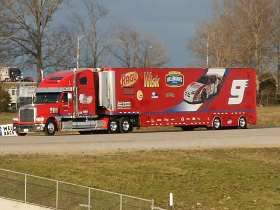Serious Question...
Topic 11324 | Page 1

Check this out: Choosing A Truck Driving Job Part VI: Dry Van and Refrigerated Companies
Dry Van:
A trailer or truck that that requires no special attention, such as refrigeration, that hauls regular palletted, boxed, or floor-loaded freight. The most common type of trailer in trucking.OOS:
When a violation by either a driver or company is confirmed, an out-of-service order removes either the driver or the vehicle from the roadway until the violation is corrected.

Check this out: Choosing A Truck Driving Job Part VI: Dry Van and Refrigerated Companies
Dry Van:
A trailer or truck that that requires no special attention, such as refrigeration, that hauls regular palletted, boxed, or floor-loaded freight. The most common type of trailer in trucking.OOS:
When a violation by either a driver or company is confirmed, an out-of-service order removes either the driver or the vehicle from the roadway until the violation is corrected.

Reefer is more responsibility. You have to make sure there is fuel in the tank and that motor is working properly and that temps are checked in route. You have to make sure they match the BOL required temperature (s). Your trainer will instruct you on reefer operation; starting, setting temp (s), shut down, and responding to alarms. Unless you are running dedicated, reefer loads tend to travel longer distances from shipper to receiver. At times you may need to "wash-out" the reefer between loads.
Shipper:
The customer who is shipping the freight. This is where the driver will pick up a load and then deliver it to the receiver or consignee.
Reefer:
A refrigerated trailer.

Just from what I've been reading, reefer runs are longer as mostly you are running perishables across country, tomatoes, ice cream, meat, stuff like that. As a result, I would think that the loads are also lighter in weight. I would also think that sensitive computer parts and things of that nature would also travel in a temperature controlled environment, more so in the dead of winter when freezing and condensation could be problems.
My hats off to all the brave men and women who keep the USA safe and free!
Reefer:
A refrigerated trailer.

I've run a dedicated dry van and now I'm on a refer delivering meat nationally
I sat more in the dry Van waiting to be loaded or unloaded on my back hauls from the grocery dc's and sat around even longer I.e. 24-72hrs for my dedicated loads. In sitting I'm meaning 2-4hrs past my arranged load/unload times on the grocery dc back hauls.
The refer company I'm with now, K&B transportation, almost 97% drop and hook. Zero touch. This was an issue for me at my previous dry Van company
Seriously the Walmart unloads aren't that bad just be the first to hit the guard shack an hour before your appointment time set up the truck and patiently wait in line to check in at the OCR and it goes by faster than the complaints I've heard and read. 2hrs for me on average for unload and check out. But keep in mind I mainly haul packaged meat products. Not so much veggies or fruit. Those are usually a back haul. And they do take a little longer to unload.
Checking temp takes two minutes and fueling still only takes me less than 12 min and that's cleaning front side glass and mirrors.
REFERLoads are year round no slow down like dryvan.
Dry Van:
A trailer or truck that that requires no special attention, such as refrigeration, that hauls regular palletted, boxed, or floor-loaded freight. The most common type of trailer in trucking.Dryvan:
A trailer or truck that that requires no special attention, such as refrigeration, that hauls regular palletted, boxed, or floor-loaded freight. The most common type of trailer in trucking.Drop And Hook:
Drop and hook means the driver will drop one trailer and hook to another one.
In order to speed up the pickup and delivery process a driver may be instructed to drop their empty trailer and hook to one that is already loaded, or drop their loaded trailer and hook to one that is already empty. That way the driver will not have to wait for a trailer to be loaded or unloaded.
HOS:
Hours Of Service
HOS refers to the logbook hours of service regulations.
And too put things in perspective I'm making .05cpm more running a refer than running a dedicated dryvan route.....
Dryvan:
A trailer or truck that that requires no special attention, such as refrigeration, that hauls regular palletted, boxed, or floor-loaded freight. The most common type of trailer in trucking.CPM:
Cents Per Mile
Drivers are often paid by the mile and it's given in cents per mile, or cpm.

Now in regards to the noise of the refer....my truck has a carrier apu and between the two the apu makes more noise than the refer motor....I just imagine I'm in an airplane with no earplugs flying at 20,000ft and it takes only a few minutes to knock out cold.
Now I've bought myself a SCREAMER truckers alarm clock cause I have noticed I sleep harder than when I was in the dryvan no apu with the truck idling all night.....
But hey like that hole at the other end and opinions....we all got one....but there's my two or six cents on the subject.
Dryvan:
A trailer or truck that that requires no special attention, such as refrigeration, that hauls regular palletted, boxed, or floor-loaded freight. The most common type of trailer in trucking.APU:
Auxiliary Power Unit
On tractor trailers, and APU is a small diesel engine that powers a heat and air conditioning unit while charging the truck's main batteries at the same time. This allows the driver to remain comfortable in the cab and have access to electric power without running the main truck engine.
Having an APU helps save money in fuel costs and saves wear and tear on the main engine, though they tend to be expensive to install and maintain. Therefore only a very small percentage of the trucks on the road today come equipped with an APU.


I have a guarantee pay as long as I'm available for dispatch Monday to Monday $1125.00 whether I run the miles at .45cpm or not.
So the opportunities are out there u just have to find the right one....
CPM:
Cents Per Mile
Drivers are often paid by the mile and it's given in cents per mile, or cpm.

Like Brett has mentioned in his book and in his postings to me and others. Attitude is a large factor in this industry. If your a determined self starting go getter you will excel, if u wait for others to fix your issues you will lose every time. Whiners need not apply....
It really doesn't make a big difference. Overall you can make about the same amount of money with either one and there really isn't much in the way of extra work with one or the other.
Dry van tends to have shorter average runs and more home time options. It also fluctuates more throughout the year with different seasons and holidays.
Refrigerated divisions tend to have longer average runs and home time every few weeks. The miles theoretically should be a little more consistent because you're hauling food which people eat all year round and you're also able to haul dry freight whenever you like.
Dry Van:
A trailer or truck that that requires no special attention, such as refrigeration, that hauls regular palletted, boxed, or floor-loaded freight. The most common type of trailer in trucking.New Reply:
New! Check out our help videos for a better understanding of our forum features

















Preview:








 TT On Facebook
TT On Facebook
I have a choice to run reefer(no, not that kind lol) or dry van. I'm a newbie and have to choose as I'm about to go with a trainer. What's the difference besides one is a refrigerated trailer and the other is not? And I want to salute all the other Vets out there on the road and everywhere else. Thank you for your service.
Dry Van:
A trailer or truck that that requires no special attention, such as refrigeration, that hauls regular palletted, boxed, or floor-loaded freight. The most common type of trailer in trucking.Reefer:
A refrigerated trailer.
OOS:
When a violation by either a driver or company is confirmed, an out-of-service order removes either the driver or the vehicle from the roadway until the violation is corrected.